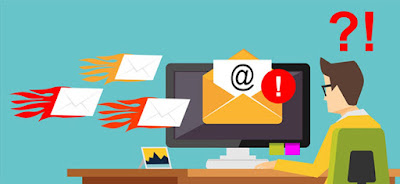WHAT IS EMAIL BOMBARDMENT?


Internet attacks are becoming more frequent and in some cases more damaging. Learn to keep your home PC protected in a simple way? I have antivirus software, is that all I need to keep my computer clean? That is one of the most common phrases often heard among Internet users.
But nothing further from reality. As with technology,
hackers daily perfect their worms and other threats to soften unsuspecting or
over-confident users.
1 -
Install reliable antivirus software: Scans files periodically for
unusual changes in file size, programs that match the software's known virus
database, suspicious email attachments, and other warning signs. Installing
reliable antivirus
software is the most important step you can take to keep your computer
virus-free.
2 -
Don't open attachments automatically - Make sure your email
program doesn't automatically download attachments to ensure that you can
examine and analyze them before running? Refer to the security options of your
mail programs or the preferences menu for instructions.
3 -
Analyze all the attachments that come through the e-mail: Make
sure to run every attachment that you plan to open through the antivirus check.
Do this albeit you recognize and trust the sender. Malicious codes like Trojans
can creep into your system, even when they appear to be from a friendly source.
4 -
Get immediate protection: Set your antivirus software to start
automatically at startup and run at all times to provide backup protection in
case you forget to scan an electronic attachment or decide not to scan it. And
in case you forget to start your antivirus software, setting it to start by
itself ensures immediate protection.
5 -
Update your antivirus software frequently: An antivirus program is
only good if it is updated frequently. New viruses, worms, and Trojan horses
are created daily, and their variations can be brought in by out-of-date
software. Most products have an option to update automatically.
6 - Do
not download programs from the web: Untrustworthy sources such
as Internet newsgroups or websites that you have never heard of may be virus providers.
Avoid download files that you don't know are safe for. This includes freeware,
screen savers, games and other executable programs, files with the extension
".exe" or ".com" like "coolgame.exe". If you have
to download from the Internet, be sure to analyze each program before running
it using antivirus. Save
all your downloads in an easy-to-find folder, and then run a virus scan on all
files in the folder before using them.
7 - Do
not boot from a floppy disk: They are one of the most
common methods of transmitting viruses. If you are using a floppy disk while
working on your computer, remove it when you shut down the computer or else the
computer will automatically try to boot from the floppy disk perhaps running
viruses on the disk.
8 - Do
not share floppy disks: Even a well-intentioned friend can
unknowingly infect you with a virus, Trojan horse or worm. Label your floppy
disks clearly so you can distinguish yours and do not loan them out. If a
friend lends you a floppy disk that is not theirs, suggest an alternative
method of sharing files.
9 -
Analyze floppy disks before use: It is always important to
analyze floppy disks before use, especially if you are using the disk to carry
information between one computer and another. You can easily pick up a virus
from an insecure network and introduce it to your system. Run an epidemic scan
before running any of the programs on the disk to avoid infection.
10 -
Use common sense: It is always better not to make mistakes with
security. If you are unsure about an email attachment, delete it, especially if
it comes from a source you do not recognize. If there is animated material on a
site that appears to be unprofessional, do not download it.
It is worth clarifying that today there are very good free
antivirus programs for those who cannot or do not want to access paid
protection systems.
Comments
Post a Comment